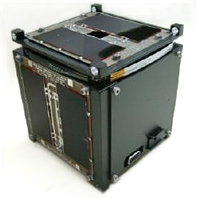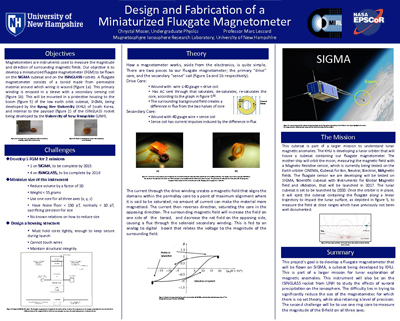New Hampshire NASA EPSCoR
Research & Infrastructure Development
Miniaturization of Instrumentation and Electronics for CubeSats is a collaboration between University of New Hampshire and Dartmouth College. It will develop increased infrastructure for low-cost access to space research.
 |
|
|---|---|
| A basic 10x10x10cm cubesat | |
This simplification and miniaturization of satellite infrastructure makes it possible to design and produce a working satellite at low cost, offering a cost-effective way for students to get a payload into orbit. CubeSat specifications enable worldwide participation in space exploration.
A basic 10x10x10cm CubeSat is "1U" (one unit), scaleable in 1U increments. The shared dimension means that they can use a common deployment system, regardless of length. The payloads can be combined into "swarms" of CubeSat spacecraft working in concert as a multipoint investigation of geospace phenomena.
Include in this project: Fluxgate Magnetometer Miniaturization, led by Dr. Marc Lessard, UNH; Energetic Particle Detector Miniaturization, led by Dr. James Connell, UNH; Highly Manufacturable Ionospheric Scientific Spacecraft Development led by Dr. Kristina Lynch, Dartmouth College. These faculty members are working with students in all aspects of the development.
 |
|
|---|---|
| Chrystal Moser, UNH Physics undergraduate presented her Fluxgate Magnetometer miniaturization project poster at the UNH Undergraduate Research Conference. | |
The Fluxgate Magnetometer project is developing a small-scale version of a fluxgate magnetometer—a key spacecraft component. The fluxgate magnetometer induces an electrical current in a remote area of the detector, comparing it to the original output current, thus measuring magnetic background.
PROJECT NEWS: The miniature fluxgate magnetometer developed in this project will be included in a Korean satellite mission, SIGMA. Scheduled to launch in 2015 on a SpaceZ Falcon 9. Much work on the mini fluxgate mangentometer was done by UNH undergraduate Chrystal Moser, advised by Dr. Marc Lessard. Read more...
The Energetic Particle Detector project builds on earlier research done at UNH, the Energetic Particle Detector Miniaturization project will develop suitable electronics for a modest form of this sensor that could be flown in a 3U CubeSat. A CubeSat so equipped could be used to study solar energetic particle events—a task previously done by larger-scale NASA missions.
The Highly Manufacturable Ionospheric Scientific Spacecraft Development led by Dartmouth Prof. Kristina Lynch and colleague Prof. Robyn Millan, is making use of commercially available technologies to create an electronics and instrumentation suite for CubeSat spacecraft. Their goal: to develop a an orbiting swarm of low-resource ionospheric spacecraft, providing hands-on projects for students of all levels.
The technology base developed in this project could be useful in a broad range of science investigations, all with an eye toward low-cost access to space science research, well within the reach of today's students.
